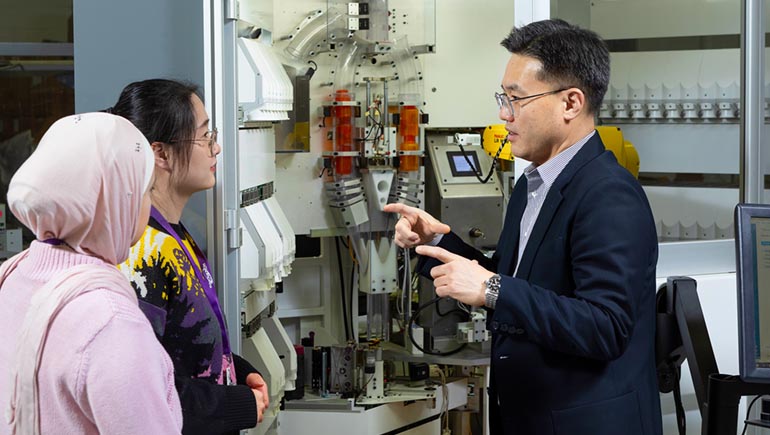No matter the research, SSIE professor is all about efficiency
Collaborations include Innovation Associates, Toyota, Raymond Corp. and healthcare companies

When you ask Sangwon Yoon what research he and his students are working on, he gives a list so long that he needs to double-check he hasn’t left anything out.
They’re collaborating with Innovation Associates in Johnson City, N.Y., to perfect a robotic assembly line called PharmASSIST that will fill 100,000 mail-order prescriptions per day. They’re also helping a microchip manufacturer with its automated testing facility in the Philippines, so that bad processors don’t end up in phones and other electronic devices.
Both Toyota Material Handling North America and forklift manufacturer Raymond Corp. seek their advice about making warehouses more efficient and cost-effective, such as by determining the most logical layouts and the best places for wireless forklift recharging stations.
Several of Yoon’s graduate students recently published a paper about streamlining traffic at John F. Kennedy International Airport in New York City to manage weather delays and to avoid late departures and arrivals.
They also have used data mining and algorithms to analyze healthcare topics such as breast, thyroid and lung cancers, and organ donation.
What ties all these diverse topics together? As a professor in the Department of Systems Science and Industrial Engineering as well as a researcher for the University’s Watson Institute for Systems Excellence (WISE), Yoon focuses on the similar problems to be solved in each realm.
Since its inception in 1989, WISE has secured over $55 million in external, sponsored research funding with various industry partners (including $2.75 million in fiscal year 2019).
“I learn the different domains, but all the techniques we use are to make the systems more efficient,” Yoon says. “The method we’re applying to air-traffic management could be the same as what we’re applying to the warehouse or assembly line.”
A key part of systems science is sifting through vast amounts of data to identify which elements are most important, then figuring out how to improve them. Yoon’s methods fuse classic systems optimization techniques with the latest methods of data mining and artificial intelligence. Sometimes, though, the answer can be as simple as synchro- nizing all clocks in a manufacturing facility.
As a lead researcher for several warehouse and factory systems studies, Yoon knows that auto- mation is the future: “If you saw the movie A.I., one character walked into a warehouse where there was no light. If there are no people there, we don’t need it. In the future, we will see more ‘lights-out’ warehouses.”
And if he has anything to do with it, those warehouses will run efficiently, too.

